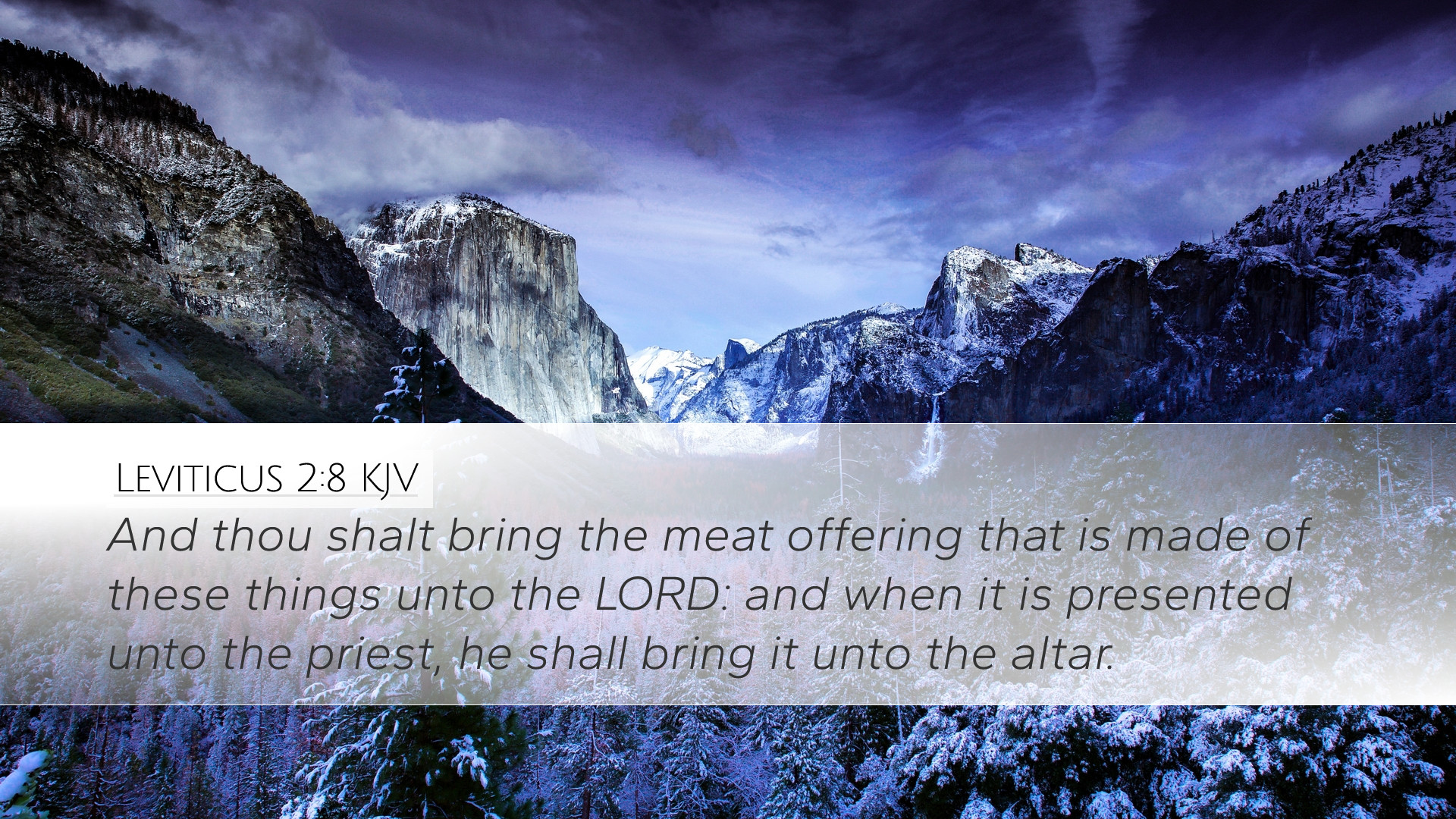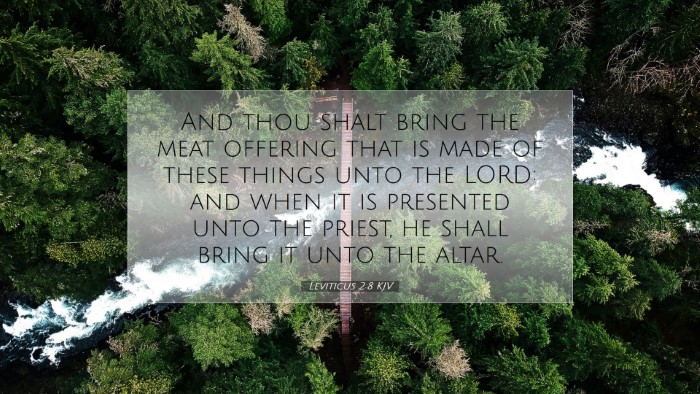Commentary on Leviticus 2:8
Verse: "And thou shalt bring the meat offering that is made of these things unto the LORD: and when it is presented unto the priest, he shall take from it his handful, and his memorial of it, and burn it upon the altar: it is an offering made by fire, of a sweet savour unto the LORD." (Leviticus 2:8, KJV)
Introduction
The verse Leviticus 2:8 revolves around the grain offering, known in Hebrew as the minchah. This offering, distinct from the burnt offering, emphasizes the human component in worship. The grain offering symbolizes gratitude, acknowledging God's provision and goodness. Ancient Israel's worship was intricate, with specific rituals conveying both reverence and sacramental meaning, reflecting the privileged relationship between God and His people.
Insights from Matthew Henry
Matthew Henry emphasizes the character of the grain offering as one of gratitude and thankfulness. He notes that this offering included fine flour, unleavened cakes, or wafers, symbolizing purity and dedication. Henry posits that this offering serves a dual purpose: first, to express the worshipper's deep appreciation for God’s blessings, and second, to foster communal ties as offerings were shared in part with the priests.
He further observes that the act of the priest taking a handful of the offering and burning it on the altar symbolized the transformation of the offering from a mere agricultural product into a spiritual act of worship. This act of fire represented God's acceptance. For Henry, the "sweet savour" indicates God's pleasure with the worshipper's heart more than with the offering itself.
Insights from Albert Barnes
Albert Barnes provides a vivid explanation of the procedural aspects of the grain offering. He draws attention to how the offering was to be presented before the Lord, thus underscoring the necessity of approaching God with sincere intent. Barnes elaborates that the worshipper must bring the offering to the priest, signifying the mediator role of the priests in approaching the Divine.
Barnes also emphasizes the inclusion of oil in the offering, which represents the anointing of the Holy Spirit. He argues that these elements are critical, as they indicate the life-giving capacity of God’s presence in the offerer's life. The emphasis on unleavened bread denotes purity as leaven is often associated with sin. Thus, the absence of leaven points to devotion devoid of malice and deceit.
Insights from Adam Clarke
Adam Clarke delves into more theological implications of Leviticus 2:8. He suggests that this offering serves as a typology of Christ’s perfect sacrifice. Clarke posits that the grain offering's characteristics foreshadow the purity and sufficiency of Christ’s offering of Himself.
Clarke notes the spiritual significance of the “sweet savour,” interpreting it as a type of God's favor upon the offering, suggesting that genuine worship is essential for pleasing God. He asserts that worship must stem from the heart, characterized by sincerity and authenticity, which in turn is reflected through our actions and offerings.
The Role of Offerings in Worship
Together, these commentaries provide a foundational understanding of the significance of offerings in biblical worship. They underscore several key points:
- The Importance of Intent: Worship is not merely about the act of offering but the condition of the heart behind it.
- Symbolism of Elements: The ingredients of the offering hold deep spiritual meanings that transcend mere ritual.
- Communal Relationships: Offerings often foster community connections and reflect shared faith among Israel's people.
- Typological Significance: The offerings point forward to Christ and His ultimate sacrifice, giving greater depth to our understanding of worship.
Conclusion
Leviticus 2:8 is not only an instruction for ancient Israel but a profound insight into the nature of worship that transcends time. In the New Testament context, these grain offerings find their fulfillment in Christ, who is the ultimate offering for humanity. The principles laid out in this verse guide modern believers in their expressions of gratitude and worship. As pastors, students, theologians, and Bible scholars reflect on this passage, they can draw valuable insights into the importance of heart in worship, the nature of God’s acceptance, and the way worship cultivates a living, dynamic relationship with the Creator.


